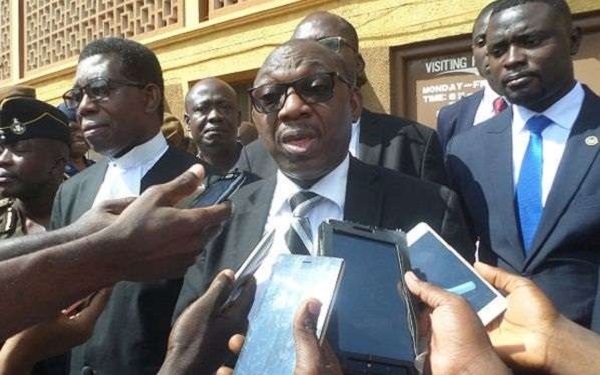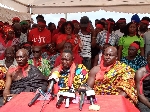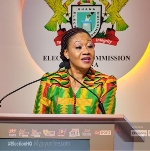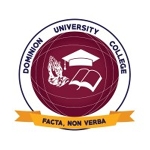Cocobod trial: Limiting our evidence-in-chief to just a day discriminatory – Agongo, Agricult to Honyenuga
 Justice Clemence Honyenuga speaking to journalists
Justice Clemence Honyenuga speaking to journalists
The Second and Third Accused persons in the ongoing GHS217-million financial loss case involving the Ghana Cocoa Board have argued that trial judge Justice Clemence Honyenuga is discriminating against them as far as the duration for the presentation of their evidence-in-chief and subsequent cross-examination is concerned.
Mr Seidu Agongo, a businessman who owns Agricult Company Limited, the agrochemical firm that supplied COCOBOD with Lithovit Foliar fertiliser which instanced the criminal prosecution, argued in court on Monday, 14 March 2022 via their lawyer Mr Nutifafa Nutsukpui that the court’s directive to them on 16 December 2021 to give their evidence-in-chief within a specific amount of time, flies in the face of natural justice since the same limitations were not placed on the prosecution when their witnesses gave their evidence-in-chief and were subsequently cross-examined.
“My Lord, this application is being made on two grounds: the first being that the applicants were not heard or given the opportunity to be heard before the honourable court made the orders that will affect the conduct of their defence before the honourable court; and, secondly, with the limitations as to time ordered by the court relating to the matter in which the court will receive evidence from the applicants and their witnesses when those same limitations or conditions have not been applied to witnesses called by the prosecution, meant that the court was applying different rules to the parties contrary to the provisions of Article 19(2)(g) of the Constitution, 1992”, Mr Nutsukpui contended.
He continued: “Now, my Lord, the prosecution called as many witnesses and examined them for as long as they considered appropriate in order to establish their case against the applicant”, adding: “No witness called by the prosecution was restricted to a day’s evidence-in-chief, as the records of the court will show”.
“Now, the orders the court made on the 16th stated clearly that the accused, which includes the applicants herein, together with their witnesses, will have not more than a day to lead evidence-in-chief and not more than a two-day sitting for their cross-examinations”.
“Respectfully, these conditions are different from those that apply to the witnesses called by the prosecution and the honourable court, in the face of Article 19(2)(g), does not respectfully have the discretion to vary the rules after the prosecution had closed its case”, Mr Nutsukpui argued.
Further, he said “if the honourable court considered that it had the discretion to do so, then in the least, it should have heard the applicants before delivering the orders of the day to the extent that those orders impacted the applicants; and respectfully, no court has the jurisdiction to make orders that will affect the party without giving them a hearing or the opportunity to be heard”.
In their counter-argument opposing the application, the prosecution, led by Stella Ohene Appiah, said: “My Lord, we submit that the orders made by this honourable court on 16th December 2021 for the applicants and their witnesses to file witness statements in their defence and the setting up of timelines for both the defence and prosecution in their evidence-in-chief and cross-examination constitute an exercise of this honourable court’s judicial discretion to reasonably control the mode and order of presenting evidence before this court”.
“My Lord, this power has been given to this honourable court under Section 69 of the Evidence Act, NRCD 323. But my Lord, it is clear from Section 69 of the Evidence Act that this honourable court had jurisdiction to make an order it made on the 16th to control the presentation of evidence before this court”, she said.
She noted: “We further submit that the order made by the court for the applicants to file witness statements does not infringe Article 19 as claimed by the applicant”.
“Article 19(2)(g) relates to conditions necessary for the examination of witnesses. The order given by this honourable court does not, in any way, take away the opportunity granted to the applicant to give evidence-in-chief and be cross-examined”.
“Indeed, nothing stops the applicants from putting down all the evidence they seek to put before this court. To that extent, we contend that there is nothing discriminatory” about “the order of the applicants to file witness statements in their defence”, she added.
“My Lord, the order setting timelines for both the prosecution and defence is still in conformity with Section 69 of the Evidence Act and necessary for effective case management to ensure an expeditious trial as mandated by Article 19(1) of the 1992 Constitution”, she contended.
Meanwhile, the First Defence Witness in the five-year-old trial, Mr Charles Tetteh Dodoo, told the High Court on the same day that no preferential treatment was accorded Agricult Company Limited regarding the state-owned cocoa-buying company’s contract with the private company owned by Mr Agongo (The Second Accused Person) for the supply of Lithovit Foliar Fertiliser.
Mr Dodoo, who served on the Board of COCOBOD from June 2009 to December 2016, said the contract that was awarded to Agricult Company Limited by COCOBOD, was signed by the then-CEO, Dr Opuni, and executed on 26 March 2014.
In his evidence-in-chief, Mr Dodoo told the court, “My Lord, it is not correct” that the supply of Lithovit fertiliser “did not follow the normal procedure” as alleged by the Prosecution.
According to him, “Contracts for the supply of Lithovit followed the processes and procedures for all other contracts”, insisting: “There has not been any special treatment for the contracts for the supply of Lithovit”.
Lithovit contracts, he noted, “have been processed like any other contracts involving agrochemicals in COCOBOD from the inception: seeking approval from PPA through to the performance bonds and preparation of contract documents and then it being signed and witnessed have been the same for all other contracts”.
“My Lord, I want to add that nothing untoward has been done in the contract of the supply of Lithovit”, he reiterated.
Asked by Mr Samuel Cudjoe, the Lead Counsel for Dr Opuni (the First Accused Person) if he knew the nature of Lithovit fertiliser, since he witnessed the contract for the sole-sourcing of one million litres of the agrochemical, Mr Dodoo answered: “It is liquid, per the name, and I have seen it in the warehouses”.
Again, asked for clarity with regard to the specific warehouses, Mr Dodoo said: “COCOBOD’s warehouse on the Spintex Road, Accra” and “another COCOBOD warehouse in Nsawam”.
Mr Cudjoe then asked the witness: “Now, what do you have to say when the Prosecution states that the purchase of Lithovit was shrouded in controversy?”
He answered thus: “My Lord, I don’t understand the controversy of Lithovit purchases because of where I sat on the Board as a Board member, and as Director of Finance directly in charge of procurement as a member of the Entity Tender Committee, there has not been any controversy about Lithovit”.
Throwing further light on what the Entity Tender Committee had to do with the procurement of Lithovit fertiliser, Mr Dodoo said: “The Committee had to give concurrent approval to all approvals from PPA and original approvals to other contracts. So, these approvals from the Entity Tender Committee or ETC will go to management for their implementation”.
He stressed, “There was no controversy about Lithovit. We have not had any controversy about the pricing or the form of the substance”.
Mr Dodoo said there were “identical contracts” that “were entered into with various companies about the same for the supply of fertilisers and other agrochemicals”.
“My Lord, I recall there was that for Sidalco, Olam and others”.
Tendering three documents to back his evidence, Mr Dodoo, led in evidence by Mr Cudjoe, said: “My Lord, I have three documents, one for Sidalco, another one for Louis Dreyfus Commodities then the third one for Chemico Limited. All the three documents were contracts for the supply of various fertilisers. They were all signed in March 2014”.
Respectively, he said the three other contracts were executed on 26, 28 and 24 March 2014 and, just like Agricult’s, were all awarded by COCOBOD.
He said the contract for the supply of Lithovit Liquid Fertiliser between COCOBOD and Agricult was prepared by the Procurement Unit of COCOBOD and signed by the then-Chief Executive Dr Opuni “on behalf of the purchaser”.
“It is the same for all contracts”, he told the court.
Mr Dodoo, who said the Lithovit contract was “witnessed by me when I was the Director of Finance”, also told the court: “My Lord, in 2015, at about the same time, identical contracts were entered into with other companies for the supply of fertilisers. I can recall popular ones that we normally do; that is Sidalco, Olam, Chemico.”
Additionally, Mr Dodoo said there were “identical contracts” between COCOBOD and Seyi Jones Limited, as well as ABP for the supply of fertiliser, for which he tendered some documents as proof.
He reiterated that just as was done in the case of Agricult, these other contracts were prepared by COCOBOD’s Procurement Unit and signed by Dr Opuni.
The case has been adjourned to Thursday, 17 March 2022.
In March 2018, the AG charged Dr Opuni and Mr Agongo with 27 counts for allegedly engaging in illegalities that caused financial loss of GHS271.3 million to the state and allegedly led to the distribution of sub-standard fertilisers to farmers.
Mr Agongo is alleged to have used fraudulent means to sell sub-standard fertiliser to COCOBOD for onward distribution to cocoa farmers while Dr Opuni is accused of facilitating the act by allowing Mr Agongo’s products not to be tested and certified as required by law.
The two accused persons have pleaded not guilty to all the 27 charges and are currently on bail in the sum of GH300,000 each.
Source: Classfmonline.com
Trending News

GAF deploys 400 additional troops to Bawku under Operation Maidabuuri II
14:27
NPP to acclaim Akwatia by-election PC tomorrow
12:02
Tension escalates in Manso Tontokrom over planned military deployment to disputed Asanko mining site
04:55
'Cedi no apicki’ – Finance Minister declares amid strong currency gains
14:58
EC sets September 2 for Akwatia by-election following MP’s death
14:18
Dominion University to host groundbreaking media AI conference on July 31
13:15
NPP to open nominations for 2028 flagbearer race on July 29
06:03
Hard-earned progress, not mere luck – Ato Forson declares during Mid-Year Budget presentation
14:54
Military assaults eyewitness at alleged McDan property demolition site
14:06
Hepatitis poses major public health threat in Ghana – MPs call for action
11:02




